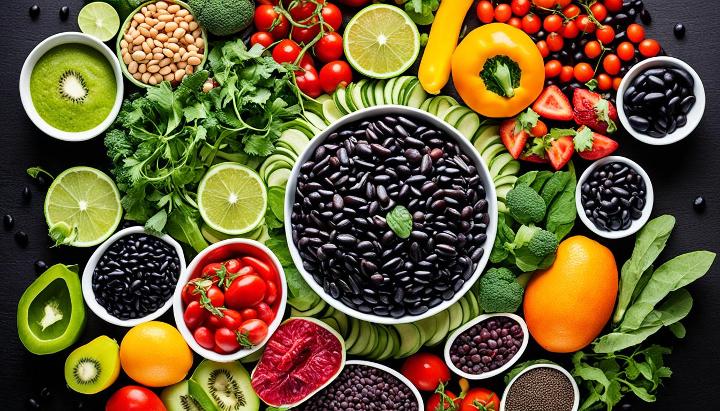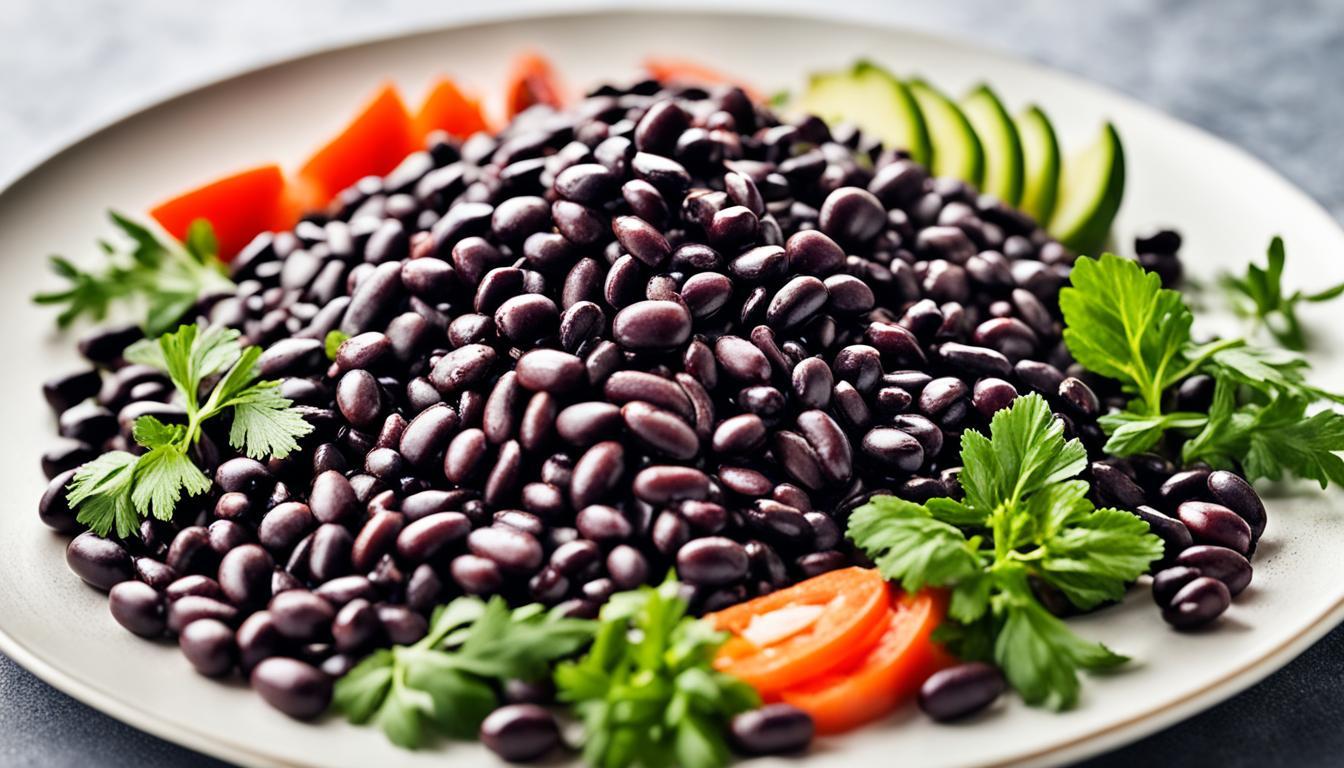Black Beans Nutrition Facts - Health Benefits Revealed

Are you curious about the nutritional value packed within a tiny bean? Have you ever wondered how black beans can benefit your health? Let us take you on a journey to explore the black beans nutrition facts and discover the incredible health benefits they offer.
Black beans, also known as turtle beans and frijoles negros, have been a beloved staple in North American diets for thousands of years. But what makes them so special? These small legumes are not only delicious, but they are also a nutritional powerhouse.
Loaded with antioxidants, fiber, protein, and carbohydrates, black beans can play a vital role in promoting overall health and well-being. From reducing the risk of serious medical conditions to aiding in weight management, these humble beans have plenty to offer.
Key Takeaways
Black beans are rich in antioxidants, fiber, protein, and carbohydrates.
They can reduce the risk of serious medical conditions.
Black beans can help regulate blood sugar levels and prevent certain types of cancer.
Incorporating black beans into your diet can improve heart health and aid in weight management.
They provide essential vitamins and minerals for overall well-being.
The Nutritional Treasure Trove in Black Beans
Black beans have a rich history and are a versatile and nutritious food. They are packed with essential nutrients such as fiber, protein, and a balance of macros including carbohydrates, protein, and fats. Understanding the nutritional components of black beans can help you make informed dietary choices and reap their health benefits.
Understanding Black Beans: A Brief History and Overview
Black beans, also known as turtle beans and frijoles negros, have been an integral part of North American diets for thousands of years. They have been cultivated and consumed by indigenous cultures for their nutritional value and versatility in cooking. Black beans are an excellent source of plant-based protein and are often used as a staple ingredient in vegetarian and vegan diets.
Nutritional Components of Black Beans
Black beans are packed with essential nutrients that contribute to overall health and well-being. They are an excellent source of dietary fiber, which helps promote healthy digestion and aids in weight management. A one-cup serving of cooked black beans provides approximately 15 grams of fiber. They are also rich in plant-based proteins, offering approximately 15 grams of protein per one-cup serving. In addition, black beans contain a variety of vitamins and minerals, including folate, iron, magnesium, and potassium.
Furthermore, black beans are low in fat and cholesterol-free, making them a heart-healthy food choice. They are also a good source of antioxidants, which help protect the body against harmful free radicals and reduce the risk of chronic diseases.
The Balance of Macros: Proteins, Carbs, and Fats
Black beans provide a well-rounded balance of macronutrients that are essential for maintaining optimal health. They contain both carbohydrates and proteins, making them an ideal food for those seeking a balanced diet. One cup of cooked black beans contains approximately 41 grams of carbohydrates and 15 grams of protein.
In terms of fats, black beans are relatively low in total fat and contain minimal saturated fat. They are a good source of healthy fats, such as omega-3 and omega-6 fatty acids, which are beneficial for brain health and heart function.
The balanced combination of fiber, protein, and healthy fats in black beans makes them a satisfying and nutritious food choice that can contribute to a well-rounded diet.
Can of Black Beans Nutrition: A Closer Look
Canned black beans are a convenient option for many people. They offer similar nutrition to cooked dry beans, providing essential nutrients such as fiber, protein, vitamins, and minerals. It's important to read the labels and choose low sodium options. Canned black beans are a great addition to various recipes and can provide a nutritious boost to your meals.
Canned black beans provide a range of important nutrients that contribute to a healthy diet. They are a good source of dietary fiber, which can aid in digestion and promote feelings of fullness, helping to support weight management. The fiber in black beans can also help regulate blood sugar levels and promote heart health.
Additionally, canned black beans are a rich source of plant-based protein, which is essential for building and repairing tissues in the body. Protein also helps to keep you feeling satisfied after meals and can contribute to maintaining a healthy weight. Pairing black beans with whole grains, such as brown rice or quinoa, can create a complete protein source.
When it comes to vitamins and minerals, black beans are a standout. They contain significant amounts of folate, iron, magnesium, and potassium. Folate is essential for cell growth and development, while iron is important for carrying oxygen through the body. Magnesium and potassium are necessary for maintaining proper muscle function and supporting overall heart health.
It's worth noting that while canned black beans are a convenient option, they can sometimes be higher in sodium compared to cooked dry beans. To minimize sodium intake, rinse canned black beans thoroughly before using them in recipes. Opting for low sodium varieties whenever possible can also help reduce overall sodium intake.

Adding canned black beans to your meals is an easy and delicious way to incorporate vital nutrients into your diet. They can be enjoyed in a variety of dishes, from soups and stews to salads and tacos. The versatility and nutritional value of canned black beans make them a pantry staple that can support overall health and well-being.
Nutrient | Amount per Serving (1 cup, canned) |
Calories | 218 |
Total Fat | 0.9g |
Saturated Fat | 0.2g |
Trans Fat | 0g |
Cholesterol | 0mg |
Sodium | 621mg |
Total Carbohydrate | 40.8g |
Dietary Fiber | 15g |
Total Sugars | 0.6g |
Protein | 15.2g |
Potassium | 611mg |
Calcium | 46mg |
Iron | 3.6mg |
Magnesium | 92mg |
Folate | 295mcg |
The Wholesome Advantages of Black Beans in Your Diet
Black beans offer a wide range of health benefits when incorporated into your diet. The combination of their low glycemic index and high fiber content makes them an excellent choice for blood sugar control and diabetes management.
Blood Sugar Control and Diabetes Management
Black beans have a low glycemic index, which means they have a minimal impact on blood sugar levels. The fiber content in black beans also helps regulate blood sugar by slowing down the absorption of carbohydrates. Incorporating black beans into your meals can assist in maintaining stable blood sugar levels and managing diabetes.
Cancer Prevention and the Role of Antioxidants
Black beans contain antioxidants that play a crucial role in preventing cancer and protecting against oxidative stress. These antioxidants help neutralize harmful free radicals and reduce the risk of cell damage and DNA mutations, which are associated with the development of cancer.
Contributing to Heart Health and Cholesterol Management
Consuming black beans can contribute to heart health and cholesterol management. The soluble fiber found in black beans helps lower cholesterol levels by binding to excess cholesterol in the digestive system and eliminating it from the body. This process can reduce the risk of heart disease and improve overall cardiovascular function.
Weight Management and Satiety: Fiber's Impact
Black beans are an excellent food for weight management due to their high fiber content. Fiber provides a feeling of fullness, helping to curb hunger and control food intake. Including black beans in your meals can promote weight loss or maintenance by reducing calorie consumption and prolonging satiety.

Benefits of Black Beans | Keywords |
Blood sugar control and diabetes management | black beans and blood sugar control |
Cancer prevention and the role of antioxidants | black beans and cancer prevention |
Contributing to heart health and cholesterol management | black beans and heart health |
Weight management and satiety: Fiber's impact | black beans and weight management |
Conclusion
Black beans are a nutritional powerhouse that can offer a variety of health benefits. Their rich nutritional profile makes them an excellent addition to any diet. Not only are they low in fat and calories, but they are also packed with essential nutrients such as fiber, antioxidants, and protein.
By incorporating black beans into your meals, you can enhance your overall health and well-being. The fiber in black beans can support digestive health, help manage weight by promoting a feeling of fullness, and regulate blood sugar levels. The antioxidants found in black beans can protect against oxidative stress and lower the risk of certain diseases, including cancer.
Whether enjoyed in soups, salads, or as a side dish, black beans are a versatile and delicious addition to any meal. They can be easily incorporated into various recipes, providing not only a burst of flavor but also a significant nutritional boost. So, why not start reaping the numerous health benefits of black beans today and indulge in their culinary versatility?







![[BWBL] Hammer Shaker](/web/image/product.product/1550/image_256)
![[WC24] Whey Protein Powder (Chocolate)](/web/image/product.product/3855/image_256)